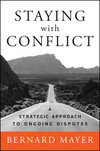In Staying with Conflict (Jossey-Bass, 2009), Bernard Mayer outlines a unique approach to conflict resolution. Rather than suggesting ways to quickly solve conflict, he offers strategies to encourage engagement between antagonists, ones that deepen their relationship over time rather than try to fix the problem right away.
A successful negotiator does not "run away from conflict, resort to destructive escalation, or attempt to find a grand resolution for a conflict that is by its nature ongoing and deeply rooted," he writes. Instead, Mayer argues, successful conflict resolution involves dialog over time, patience, positive communication, and deep respect for the other party involved.
Although directed primarily at conflict resolution specialists, the book's message translates to any type of conflict, including interpersonal or work conflicts. Mayer provides ample examples of each throughout the book to illustrate and deepen his message: that engagement is a much more satisfying and fulfilling goal than simply winning.
…
In Longing and Belonging (University of California Press, 2009), University of Virginia sociologist Allison Pugh examines why children (and their parents) want to buy things even when they can't afford them. Instead of laying blame only on the advertising industry or on over-indulgent parenting, the book examines the real pressures children face to buy things in order to fit in within their social environments.
According to Pugh, owning name products and following popular media allows children to participate in conversations with their peers, which in turn gives them a sense of belonging. The desire to belong is universal, argues Pugh, but in a consumer society, our socioeconomic status limits the size of our social circle.
Consumerism tears at our social fabric and creates inequity, but Pugh says it will remain a strong force in our culture as long as it continues to be a means for children to connect with each other.
…
In many ways a follow-up to his theory of "Multiple Intelligences," Harvard psychologist Howard Gardner's Five Minds for the Future (Harvard Business Press), recently released in paperback (the hardcover was published in 2007), identifies the skills Gardner believes people must master to be successful in our ever-changing world. He labels these skills the "five minds"—the disciplined mind, the synthesizing mind, the creating mind, the respectful mind, and the ethical mind—and explains how these skills have been used over time to further science, knowledge, and solutions to world issues. Gardner examines how we can cultivate these strengths in ourselves and others in order to make progress toward a better future.
Watch a lecture by Howard Gardner on Five Minds for the Future on teachers.tv.
 ©
© 
 ©
©  ©
© 

Comments